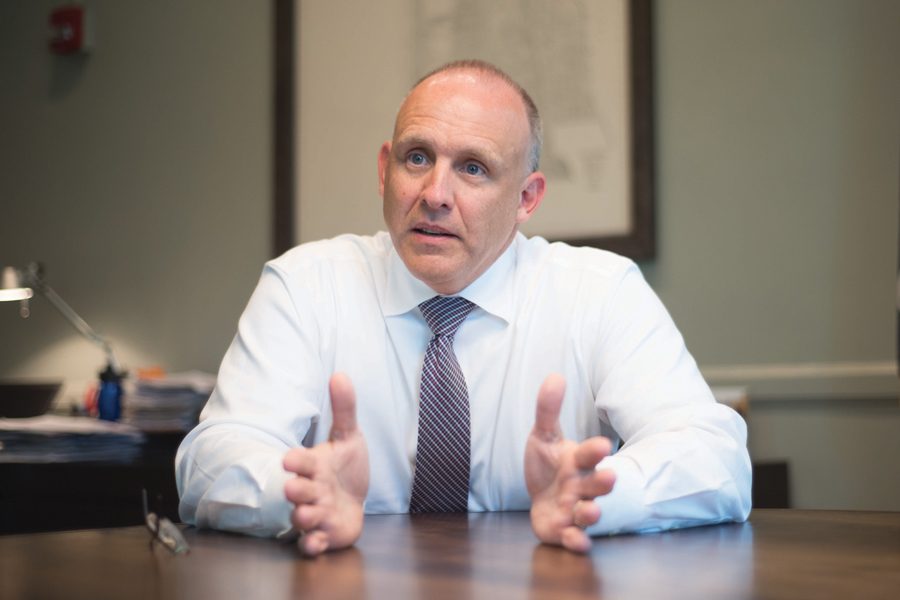City Council receives economic development update and recommendations in light of COVID-19 impact
Daily file photo by Alison Albeda
Mayor Steve Hagerty. Hagerty announced Wednesday that he will not seek re-election.
September 15, 2020
City officials predict that Evanston’s economic conditions will worsen in the upcoming months, according to an economic development update during a Monday council meeting. Staff highlighted factors including a diminished Northwestern student population on campus, decreased revenue in numerous areas and business closures as causes for the decline.
“It’s going to be a tough road,” Paul Zalmezak, the city’s economic development manager, said . “We’re going to get through it and when we’re through it, these shifts that we’re seeing in the short term are hopefully not going to be permanent.”
Zalmezak said retailers in Evanston have seen 50 percent of the revenues they saw last year. A decrease in transit ridership, widespread layoffs and an increase in remote work among office populations have caused a decline in daytime populations, causing higher levels of closures. The limited students allowed on Northwestern’s campus have also impacted revenue for hotels, athletics, local restaurants and coffee shops.
Acting Deputy City Manager Paulina Martínez said economic conditions in Evanston were strong prior to the pandemic. The city continues to be a desirable place to live due to the accessibility it provides to Lake Michigan, its proximity to Chicago and the support it receives from Northwestern’s institutions.
However, Martínez said Evanston will begin to see the impact of the pandemic through high unemployment rates, higher vacancy rates within business districts and diminishing tax revenues.
“The economic distress that we are experiencing is just starting,” Martínez said. “Although so far we have not experienced as many business failures as we first feared, we will likely see an increase of closing during the winter months, especially if federal assistance does not come through.”
Martínez said Evanston began 2020 with an unemployment rate of 2 percent, however it skyrocketed to 13 percent amid shelter in place orders. As of July, the city’s unemployment rate is 10 percent.
Martínez also said approximately 70 Evanston businesses have closed this year, though around 30 of these closures were not a result of the pandemic. More recently, Unicorn Cafe closed permanently after nearly 30 years in operation. However, despite the adverse economic conditions, 40 new businesses have emerged.
Since the start of the pandemic, Martínez said Evanston has implemented multiple economic aid programs — like the Entrepreneurship Support Program, which brought in $100,000 in assistance for businesses, $50,000 of which was from local employment program accounts. Businesses can also receive pro bono consulting from Northwestern’s Kellogg School of Management.
Mayor Steve Hagerty said he has been looking into coronavirus relief funds, especially with Congress currently being at a standstill. Evanston has received $620,000, but Hagerty believes more funds will come in.
“We ought to think about how that money can be used in economic development to support our local economy, because it’s going to take years, honestly, to recover from this,” Hagerty said.
Zalmezak advised council members to focus more on economic stability, rather than economic growth, going forward. He said taking care of the environment Evanston provides, including benefits like the lakefront and desirable housing, should be prioritized.
Zalmezak also said the city should continue promoting sustainability initiatives, finding new ways to utilize property and developing the workforce.
“We’re suggesting that recovery and restructuring is going to require some serious leadership and creativity,” Zalmezak said. “We need to align our operations and policies to help stabilize the local economy and expand revenues.”
Correction: A previous version of this story misidentified the amount and sources of money the city was putting toward business assistance, as well as the availability of the funds. The previous version also misrepresented Northwestern’s Kellogg School of Management’s contributions to Evanston businesses. The Entrepreneurship Support Fund brought in $100,000 in aid for local businesses, part of which was from local employment program accounts, but is now closed. Additionally, Kellogg is only providing pro bono consulting to Evanston businesses. The Daily regrets the errors.
Email: [email protected]
Twitter: @juliaa_grace
Related Stories:
— City council reviews 2020 budget projections, COVID-19 grants and 2021 budget plans


